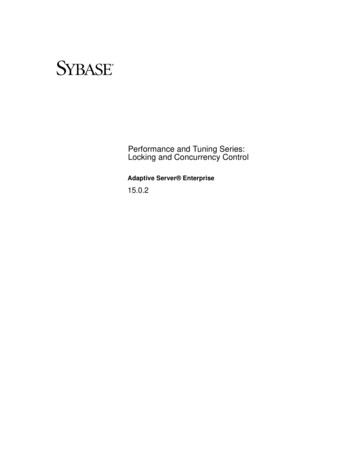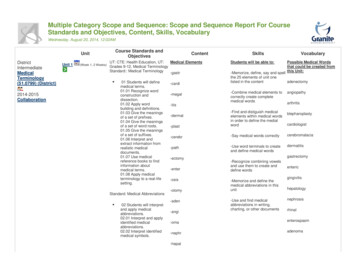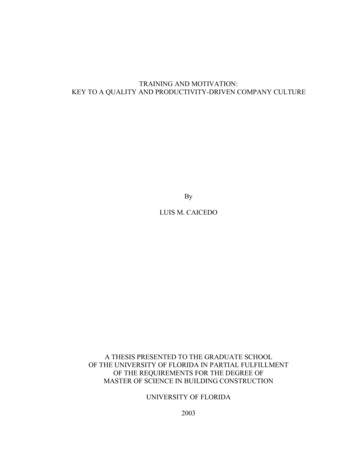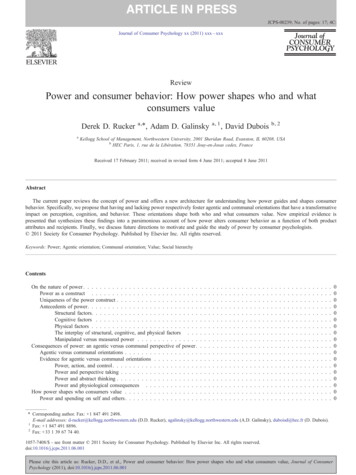
Transcription
Concurrency andParallelism withC 17 andC 20/23Rainer GrimmTraining, Coaching and,Technology Consultingwww.ModernesCpp.de
Concurrency and Parallelism in C
Concurrency and Parallelism in C 17
Parallel STLYou can choose the execution policy of an algorithm. Execution policiesstd::execution::seq Sequential in one threadstd::execution::par Parallelstd::execution::par unseq Parallel and vectorisedSIMD
Parallel STLconst int SIZE 8;int vec[] {1, 2 , 3, 4, 5, 6, 7, 8};int res[SIZE] {0,};int main(){for (int i 0; i SIZE; i){res[i] vec[i] 5;}}Not vectorisedVectorised
Parallel STLusing namespace std;vector int vec {1, 2, 3, 4, 5, . }sort(std::vec.begin(), vec.end());// sequential as eversort(execution::seq, vec.begin(), vec.end());// sequentialsort(execution::par, vec.begin(), vec.end());// parallelsort(execution::par unseq, vec.begin(), vec.end()); // par vec
Parallel STLadjacent difference, adjacent find, all of any of, copy,copy if, copy n, count, count if, equal, exclusive scan,fill, fill n, find, find end, find first of, find if,find if not, for each, for each n, generate, generate n,includes, inclusive scan, inner product, inplace merge,is heap, is heap until, is partitioned, is sorted,is sorted until, lexicographical compare, max element,merge, min element, minmax element, mismatch, move,none of, nth element, partial sort, partial sort copy,partition, partition copy, reduce, remove, remove copy,remove copy if, remove if, replace, replace copy,replace copy if, replace if, reverse, reverse copy,rotate, rotate copy, search, search n, set difference,set intersection, set symmetric difference, set union,sort, stable partition, stable sort, swap ranges,transform, transform exclusive scan,transform inclusive scan, transform reduce,uninitialized copy, uninitialized copy n,uninitialized fill, uninitialized fill n, unique,unique copy
Parallel STLstd::transform reduce Haskells function map is called std::transform in C std::transform reducestd::map reduce
Parallel STL Danger of data races or deadlocksint numComp 0;std::vector int vec {1, 3, 8, 9, 10};std::sort(std::execution::par, vec.begin(), vec.end(),[&numComp](int fir, int sec){ numComp ; return fir sec; });The access to numComp has to be atomic.
Parallel STL Support for std::execution::par GCC and Clang MSVC with Visual Studio 2017 15.8 (/std c latest)copy, copy n, fill, fill n, move, reverse,reverse copy, rotate, rotate copy, swap rangesadjacent difference, adjacent find, all of, any of,count, count if, equal, exclusive scan, find,find end, find first of, find if, for each,for each n, inclusive scan, mismatch, none of,partition, reduce, remove, remove if, search,search n, sort, stable sort, transform,transform exclusive scan, transform inclusive scan,transform reduce
Concurrency and Parallelism in C 20/23
ExecutorsExecutors are the basic building block for execution in C . They fulfil a similar role for execution such as allocators forallocation.An executor consists of a set of rules for a callables: Where: run on a internal or external processor When: run immediately or later How: run on a CPU or GPU
Executors Using an executormy executor type my executor . ;auto future std::async(my executor, []{std::cout "Hello world " std::endl; });std::for each(std::execution::par.on(my executor),data.begin(), data.end(), func); Obtaining an executorstatic thread pool pool(4);auto exec pool.executor();task1 long running task(exec);
ExecutorsAn executor provides one or more execution functions forcreating a callable.NameCardinality DirectionStandardexecutesingleonewayC 20twoway executesingletwowayC 23then executesinglethenC 23bulk executebulkonewayC 20bulk twoway executebulktwowayC 23bulk then executebulkthenC 23Cardinality: Creation of one execution agent or a group of execution agents.Direction: Directions of the execution.
std::jthreadProblem: std::thread throws std::terminate in itsdestructor if still joinable.std::thread t{[]{ std::cout "New thread"; }};std::cout "t.joinable(): " t.joinable();
std::jthreadSolution: std::jthread joins automatically at the end ofits scope.std::jthread t{[]{ std::cout "New thread"; }};std::cout "t.joinable(): " t.joinable();
std::jthread Instances of std::jthread can be interruptedReceiver (stop token) Explicit check: stop requested: yields, when an interrupt was signalled std::condition variable any wait variations with predicateSender (stop source) request stop: signals an interrupt
std::jthreadjthread nonInterruptable([]{jthread interruptable([](stop token stoken){int counter{0};int counter{0};while (counter 10){while (counter 10){this thread::sleep for(0.2s);this thread::sleep for(0.2s);cerr "nonInterruptable: "if (stoken.stop requested()) return; counter endl;cerr "interruptable: " counter; counter endl;} counter;});}});this thread::sleep for(1s);cerr endl;cerr "Main thread interrupts both jthreads" endl;nonInterruptable.request stop();interruptable.requrest stop();cout endl;
std::jthread
Atomic Smart PointersC 11 has a std::shared ptr for shared ownership. General Rule: You should use smart pointers. But: The managing of the control block and the deletion of the resourceis thread-safe. The access to the ressource is not thread-safe.Tony Van Eerd: Forget what you learned in Kindergarten. Stopsharing. Solution: std::atomic shared ptrstd::atomic weak ptr
Atomic Smart Pointer3 Reasons Consistency std::shared ptr is the only non-atomic data type for which atomicoperations exists. Correctness The correct usage of atomic operations is just based on the discipline ofthe user.extremly error-pronestd::atomic store(&sharPtr, localPtr)sharPtr localPtr Performance std::shared ptr has to be design for the special use-case.
Atomic Smart Pointer
Atomic Smart PointersAtomic smart pointers are part of the ISO C standard. Partial specialisation of std::atomic std::atomic shared ptrstd::atomic std::shared ptr T std::atomic weak ptrstd::atomic std::weak ptr T
std::future Extensionsstd::future doesn't support composition std::future ImprovementContinuation then: execute the next future if the previous one is donefuture int f1 async([](){ return 123; });future string f2 f1.then([](future int f){return to string(f.get());// non-blocking});auto myResult f2.get();// blocking
std::future Extensions when all: execute the future if all futures are donefuture int futures[] { async([]() { return intResult(125); }),async([]() { return intResult(456); })};future vector future int all f when all(begin(futures), end(futures));vector future int myResult all f.get();for (auto fut: myResult): fut.get(); when any: execute the future if one of the futures is donefuture int futures[] {async([]() { return intResult(125); }),async([]() { return intResult(456); })};when any result vector future int any f when any(begin(futures),end(futures));future int myResult any f.futures[any f.index];auto myResult myResult.get();
std::future Extensions make ready future and make exception future: createa future directlyfuture int compute(int x){if (x 0) return make ready future int (-1);if (x 0) return make ready future int (0);future int f1 async([]{ return do work(x); });return f1;}Futher informationC 17: I See a Monad in Your Future! (Bartosz Milewski)
std::future Extensions Disadvantages of the extended futures Futures and promises are coupled to std::thread. Where is the .then continuation be invoked? Passing futures to .then continuation is too verbose.std::future f1 std::async([]{ return 123; });std::future f2 f1.then([](std::future f){return std::to string(f.get()); });std::future f2 f1.then(std::to string); Future blocks in its destructor. Futures und values should be easily composable.bool f(std::string, double, int);std::future std::string a /* . */;std::future int c /* . */;f(a.get(), 3.14, c.get())std::future bool d2 when all(a, 3.14, c).then(f);
Latches and BarriersC has no semaphorlatches and barriers Key ideaA thread is waiting at the synchronisation point until the counterbecomes zero. latch is for the one-time use-case count down and wait: decrements the counter until it becomes zerocount down(n 1): decrements the counter by nis ready: checks the counterwait: waits until the counter becomes zero
Latches and Barriers barrier can be reused arrive and wait: waits at the synchronisation point arrive and drop: removes itself from the sychronisation mechanism flex barrier is a reusable and adaptable barrier The constructor gets a callable. The callable will be called in the completion phase. The callable returns a number which stands for the counter in the nextiteration. Can change the value of the counter for each iteration.
Latches and Barriersvoid doWork(threadpool* pool) {latch completion latch(NUMBER TASKS);for (int i 0; i NUMBER TASKS; i) {pool- add task([&] {// perform the work.completion latch.count down();}));}// block until all tasks are donecompletion latch.wait();}
CoroutinesCoroutines are generalised functions that can besuspended and resumed while keeping their state. Typical use-case Cooperative Tasks (protection from data races)Event loopsInfinite data streamsPipelines
CoroutinesDesign Principles Scalable, to billions of concurrent coroutines Efficient: Suspend/resume operations comparable incost to function call overhead Open-Ended: Library designers can develop coroutinelibraries Seamless Interaction with existing facilities with nooverhead Usable in environments where exceptions are forbiddenor not available.
gs)returnreturn statementco return someValuesuspendco await someAwaitableco yield someValueresumecoroutine handle ::resume()A function is a coroutine if it has a co return, co await,co yield call or if it has a range-based for loop with a co awaitcall.
Coroutinesgenerator int genForNumbers(int begin, int inc 1){for (int i begin;; i inc){co yield i;}}int main(){auto numbers genForNumbers(-10);for (int i 1; i 20; i) std::cout numbers " ";for (auto n: genForNumbers(0, 5)) std::cout n " ";}-10 -9 -8 -7 -6 -5 -4 -3 -2 -1 0 1 2 3 4 5 6 7 8 9 100 5 10 15 20 25 30 35 40 45 50 55 60 65 70 75 80 85 . . . .
CoroutinesBlockingWaitingAcceptor accept{443};Acceptor accept{443};while (true){while (true){}Socket so accept.accept(); // blockSocket so co await accept.accept();auto req so.read();auto req co await so.read();// blockauto resp handleRequest(req);auto resp handleRequest(req);so.write(resp);co await so.write(resp);// block}
Transactional MemoryTransactional Memory is the idea of transactions from thedata base theory applied to software. A transaction has the ACID properties without } Atomicity: all or no statement will be performedConsistency: the system is always in a consistent stateIsolation: a transaction runs total isolationDurability: the result of a transaction will be stored
Transactional Memory Transactions build a total order feel like a global lock Optimistic approachlock WorkflowRetryRollbackA transaction stores its initial state.The transaction will be performed without synchronisation.The runtime experiences a violation to the initial state.The transaction will be performend once more.
Transactional Memory Two forms synchronized blocks relaxed transaction are not transaction in the pure sensecan have transaction-unsafe code atomic blocks atomic blocks are available in three variationscan only execute transaction-safe code
Transactional Memoryint i 0;void inc() {synchronized{cout i " ,";}}vector thread vecSyn(10);for(auto& t: vecSyn)t thread([]{ for(int n 0; n 10; n) inc(); });
Transactional Memoryvoid inc() {synchronized{std::cout i " ,";this thead::sleep for(1ns);}}vector thread vecSyn(10), vecUnsyn(10);for(auto& t: vecSyn)t thread[]{ for(int n 0; n 10; n) inc(); });for(auto& t: vecUnsyn)t thread[]{ for(int n 0; n 10; n) cout i " ,"; });
Transactional Memoryint i 0;void func() {atomic noexcept{cout i " ,"; // non transaction-safe code}}A transaction can only perform transaction-safe codecompiler error
Task BlocksFork-join parallelism with task blocks.
Task Blockstemplate typename Func int traverse(node& n, Func && f){int left 0, right 0;define task block([&](task block& tb){if (n.left) tb.run([&]{ left traverse(*n.left, f); });if (n.right) tb.run([&]{ right traverse(*n.right, f); });});return f(n) left right;} define task block tasks can be perfomed tasks will be synchronised at the end of the task block run: starts a task
(1)(1)Task Blocksdefine task block restore thread.define task block([&](auto& tb){define task block([&](auto& tb)(2)tb.run([&]{ process(x1, x2); });tb.run([&]{[] func(); });if (x2 x3) tb.wait();define task block restore thread([&](auto& tb){process(x3, x4);tb.run([&]([]{ func2(); });(3) define task block([&](auto&tb.run([&]{ func3(); }(3) });.(2)wait});.});.});tb){
Task Blocks The schedulertb.run( [&] { process(x1, x2); } );ParentChild Child stealing: the scheduler steals the job and executes it Parent stealing: the task block performs the child; the schedulersteals the parentBoth strategies are possible in C 20
Concurrency and Parallelism in C MultithreadingConcurrency and Parallelism
Concurrency and Parallelism in C
Proposals Unified executors: P0443R10 (2019), dependent executorsP1244R0 (2018) Stop tokens and a joining thread P0660R8 (2019) Atomic smart pointers: N4162 (2014) std::future extensions: N4107 (2014) and P070r1 (2017) Latches and barriers: P0666R0 (2017)Coroutines: N4723 (2018)Transactional memory: N4265 (2014) TM light (2019)Task blocks: N4411 (2015)
Blogswww.grimm-jaud.de [De]www.ModernesCpp.com [En]Rainer GrimmTraining, Coaching, andTechnology Consultingwww.ModernesCpp.de
C 11 has a std::shared_ptr for shared ownership. General Rule: You should use smart pointers. But: The managing of the control block and the deletion of the resource is thread-safe. The access to the ressource is not thread-safe. Tony Van Eerd: Forget what you learned in Kin











